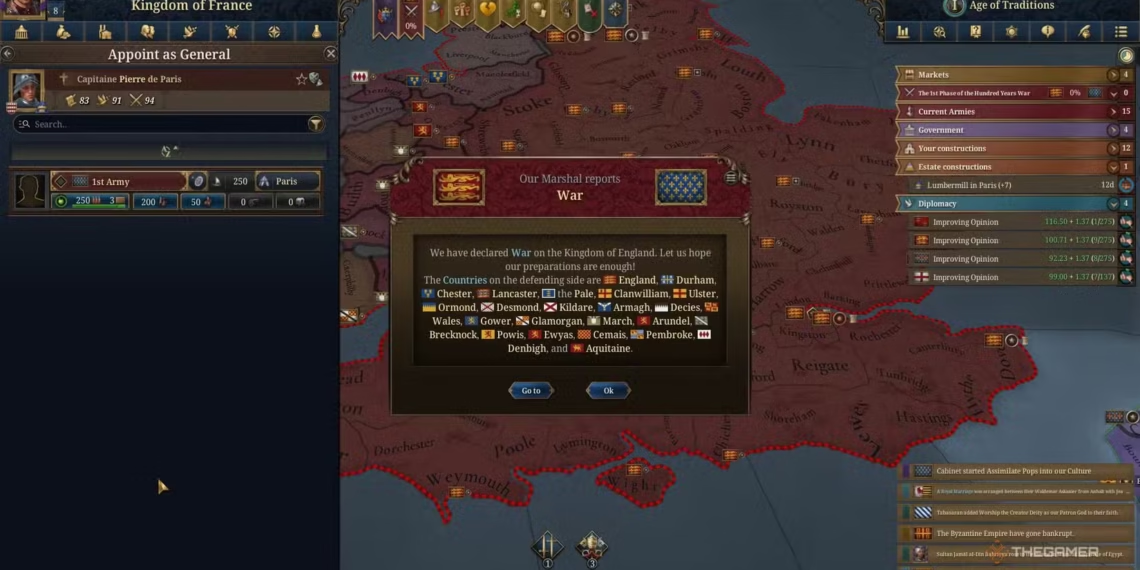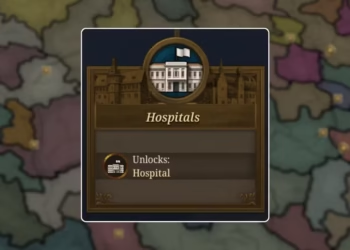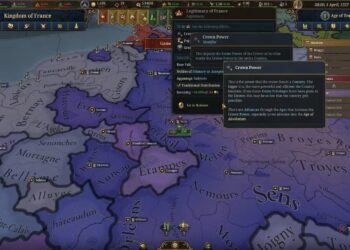Select Language:
Historians can detail the exact events of the real Hundred Years’ War, but in Europa Universalis 5, the fun lies in crafting your own version of history. Who cares about how the war truly unfolded? It’s all about how you want the story to go.
Most European nations will find themselves drawn into the conflict between England and France, as well as the civil disputes within France—so if you decide to play as King Philippe, brace yourself for internal struggles. Good luck out there!
### Hundred Years’ War Overview
Once you start in Europa Universalis 5, the war begins on July 1, 1337. While England and France are the main players, the war affects all of Europe. Even if you’re not playing as England or France, you’ll be aware of the conflict, and depending on your alliances, you might even get pulled into it.
During the first few months, both France and England make changes to regions like Aquitaine. It’s a small territory in the southeast of France, more associated with England’s color than France’s. King Edward is the Duke of Aquitaine, and if you play as that duchy, he’s your ruler.
By spring 1337, Aquitaine’s population becomes dissatisfied with English rule, showing low loyalty. On July 1, the French king dies, which kicks off the Hundred Years’ War and drags nearly all of Europe into nearly a century of fighting—unless you find a way to change history with your decisions.
### The Duchy of Aquitaine
As soon as the war begins, Aquitaine’s status shifts. It’s a key piece in the conflict, and your choices here can influence the entire game. If you play as Aquitaine, you’ll see that it’s a region more aligned with England but located in France. Tensions rise as loyalty drops, and France’s death sparks the conflict, pulling the region into a war that could last decades unless you steer it differently.
### Significant Events and Choices
On June 1, you’ll receive a message about Robert d’Artois, a noble fleeing France after trying to seize a county. France asks England to send him back — and your choice matters whether you are playing as England or France.
Look for the icon of a white book with a red bookmark. That indicates “Historical Options” — key decisions made by the ruler you’re playing. They offer guidance on pivotal choices:
– Playing as England, you can choose to surrender d’Artois and avoid war, or harbor him, which gives England a justification for war against France.
– Playing as France, you can demand d’Artois’s surrender, possibly triggering the war early, or choose to avoid conflict to maintain peace. Refusing to demand his return may cost prestige but could advance your strategic goals.
If you decide to return d’Artois, the war might be avoided. But if the war starts, each nation will have unique paths to turn the tide of battle.
### The Black Death
Early in the conflict, probably in the 1350s, the Black Death strikes your country. Both sides must deal with this devastating plague, which can quickly turn the tide of war. Managing the Black Death requires effort to stop its spread and recover population—losing people to the plague weakens your armies, as dead soldiers can’t fight. It also introduces challenges in maintaining stability and planning military actions.
### How to Win the Hundred Years’ War
The war often unfolds in phases, with information on troop movements accessible through the top bar. Staying updated helps in strategically adjusting your plans.
To succeed, you should continuously research military advancements — unlocking new ships, land units, and technologies. That progress can be vital for gaining advantages on land and sea. Since the war can last throughout the Age of Traditions, building a strong military is crucial.
During the war, if you’re playing as England or France, you’ll see “Rivalry” increase, making both countries more antagonistic toward each other. It’s wise to avoid unnecessary conflicts with other nations, as this could lead to coalitions forming against you.
Most of Europe becomes involved once the war erupts. Countries will consider their diplomatic stance carefully, as supporting either side might be viewed as hostile. The way the war plays out can vary greatly depending on your choices—sometimes ending in a quick victory, other times stretching over many decades.
There are victory conditions for each country: England can win by forcing the Union with France through a peace treaty, while France must keep fewer than four territories under English control or influence. The outcome depends entirely on your tactics and decisions.
### Building Your Military and Claiming Land
The English Channel becomes a major battleground, with intense naval battles. England gains early naval advantages, so be prepared to protect your coastlines and support invasions by maintaining a strong navy.
Ensure your military research stays active — unlocking new ships and units can help turn conflicts in your favor. The war is likely to dominate the early game, so investing in military technology boosts your chances of victory.
If you find combat overwhelming at times, it’s okay to automate military actions during intense phases. You can switch to manual control later once you’re more comfortable with warfare.
### Monitoring Subject Actions During War
Throughout the conflict, both England and France can influence their subjects. England might try to weaken French regions from within by decreasing loyalty, steering territories toward English control. France can attempt to keep its subjects loyal by granting titles or demanding autonomy, which might backfire if loyalty drops too much.
French subjects may even betray their nation and switch sides, which can escalate tensions worldwide. As a ruler, it’s important to respond quickly to such betrayals and try to bring rebellious subjects back into line, preventing them from causing further chaos.







